Key takeaways:
- Understanding international trade regulations is essential for smooth commerce, with key elements including tariffs, import/export licenses, and ethical standards like the FCPA.
- Staying organized and informed through documentation and communication with experts is crucial for navigating import/export laws and compliance requirements effectively.
- Regular engagement with resources like industry newsletters and conferences helps maintain awareness of changes and best practices in the dynamic landscape of international trade.
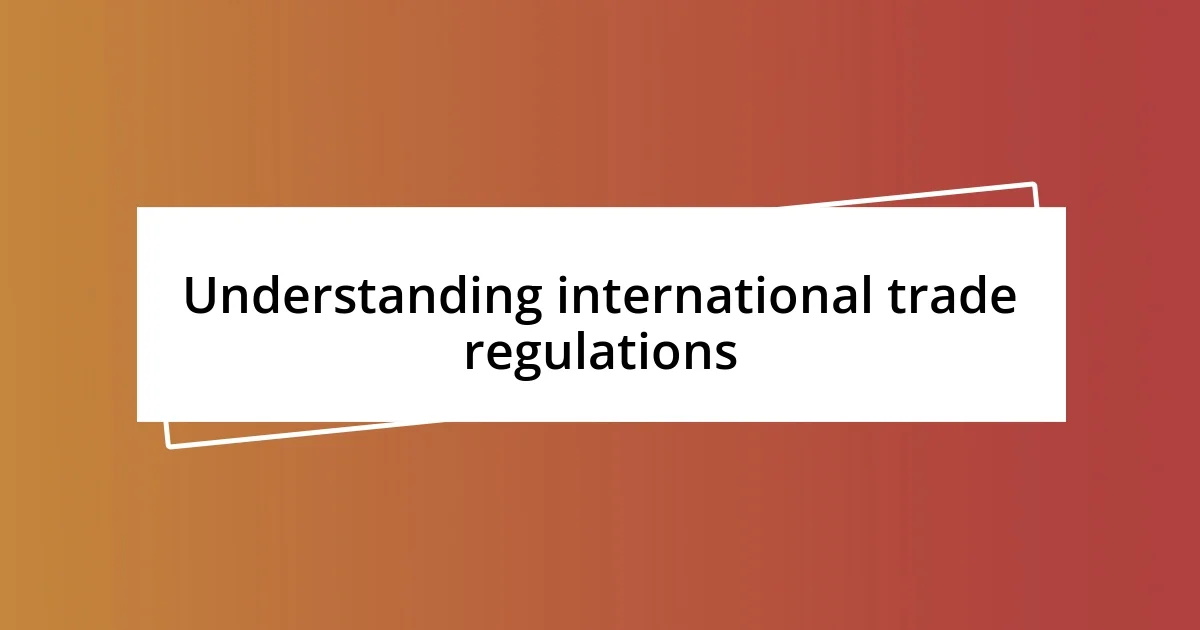
Understanding international trade regulations
Understanding international trade regulations can feel like navigating a complicated maze. I remember my first experience dealing with customs regulations; it was both exciting and overwhelming. Have you ever stood in front of a huge wall of red tape, wondering where to begin? It’s a common feeling, but once you start breaking it down, everything feels more manageable.
These regulations are not just numbers and codes; they represent the framework through which countries engage in commerce. I recall attending a seminar on trade compliance, where the speaker emphasized that each regulation is rooted in a nation’s economic strategy. This perspective shifted my understanding entirely. It made me realize that behind every rule, there are stories about protecting local industries and ensuring fair competition.
Diving deeper into these rules also illuminated the critical role of agreements, like tariffs and quotas. I found it fascinating to learn how a simple tariff can influence market dynamics and consumer choices. Have you ever considered how a trade agreement impacts the price of goods in your country? It’s remarkable to think that what seems distant can affect your everyday shopping experience right at home. Each regulation we learn about opens doors to a greater comprehension of the global market and how interconnected we truly are.
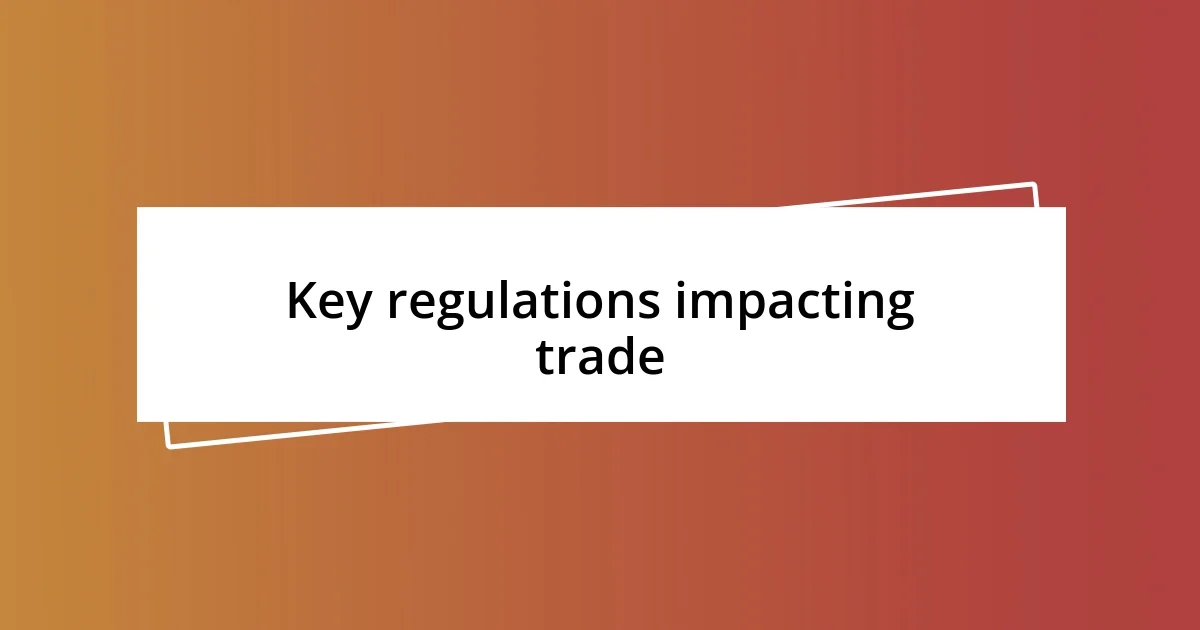
Key regulations impacting trade
Understanding key regulations impacting trade is crucial for anyone engaging in this complex arena. One experience that stands out for me involved grappling with import/export licenses. When I first learned about the documentation required to move goods across borders, I felt like I was armed with a map but still lost in the wilderness. Each license, each form, served as a reminder of the importance of compliance and thoroughness—because one misstep could result in costly delays.
Another essential regulation I encountered was the Foreign Corrupt Practices Act (FCPA). I remember discussing its implications with a colleague who had faced scrutiny over international transactions. The fear was palpable when we considered how a failure to abide by ethical standards could not only damage reputations but also lead to legal battles. This regulation highlights the necessity of not just understanding the rules but embodying them in everyday business practices.
A critical aspect that often goes unnoticed is the intricate balance between trade regulations and economic diplomacy. I once participated in a roundtable where policymakers discussed trade agreements’ roles in creating favorable conditions. It dawned on me that these regulations are more than just guidelines; they’re tools for fostering international relationships. The experience challenged me to see regulations not as barriers, but as opportunities for growth and collaboration.
| Regulation | Key Impact on Trade |
|---|---|
| Import/Export Licenses | Ensures compliance and facilitates smooth movement of goods. |
| Foreign Corrupt Practices Act (FCPA) | Promotes ethical business practices and protects reputation. |
| Trade Agreements | Acts as instruments for economic diplomacy and market expansion. |
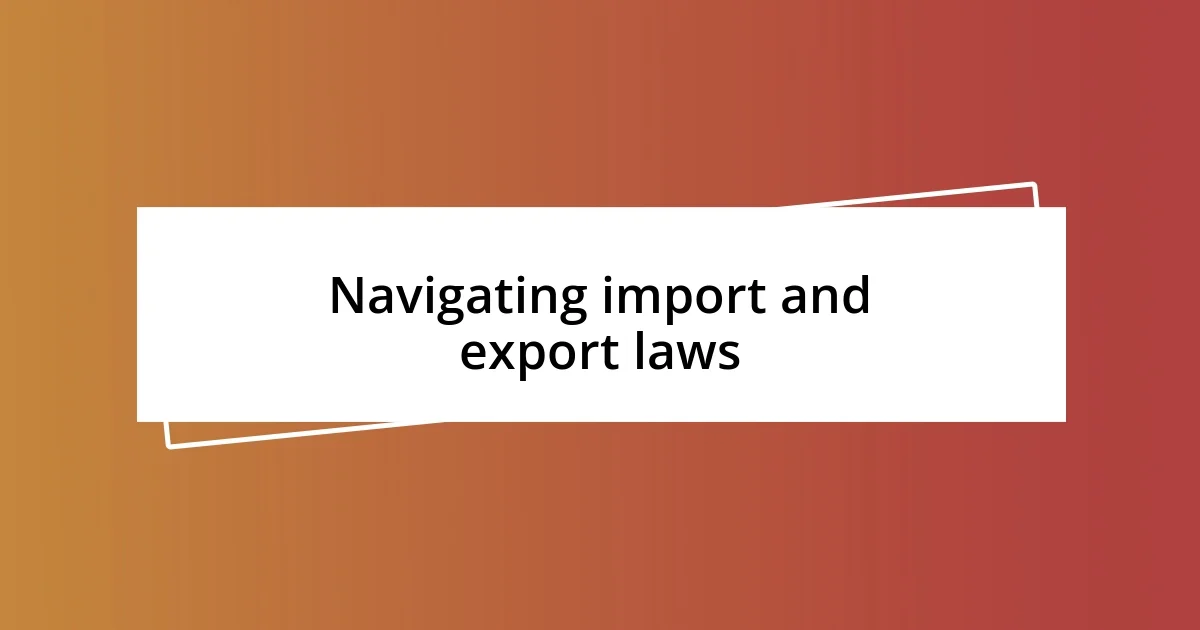
Navigating import and export laws
Navigating import and export laws can feel like an uphill battle, especially if you’re venturing into these waters for the first time. I remember the nerves I felt when I had to file my first export declaration. Each step seemed filled with hidden pitfalls. I quickly learned that staying organized is not just useful; it’s essential. Having a solid checklist helped ease my anxiety and granted me confidence in my transactions.
Here’s a glimpse of key considerations I leaned on during the process:
- Stay Informed: Regulations can change frequently, so subscribing to trade newsletters became my go-to resource.
- Documentation is Key: I realized that having accurate and complete paperwork is crucial to preventing delays at customs.
- Understand Country-Specific Requirements: Every destination has unique hurdles, and knowing them in advance saved me time and headaches.
- Engage with Experts: Consulting customs brokers or trade specialists provided me with clarity when I felt overwhelmed.
Each point of focus allowed me to move with more agility in the complex landscape of trade laws. The sense of achievement I felt after successfully navigating my first import process was exhilarating, making the learning curve well worth the effort.
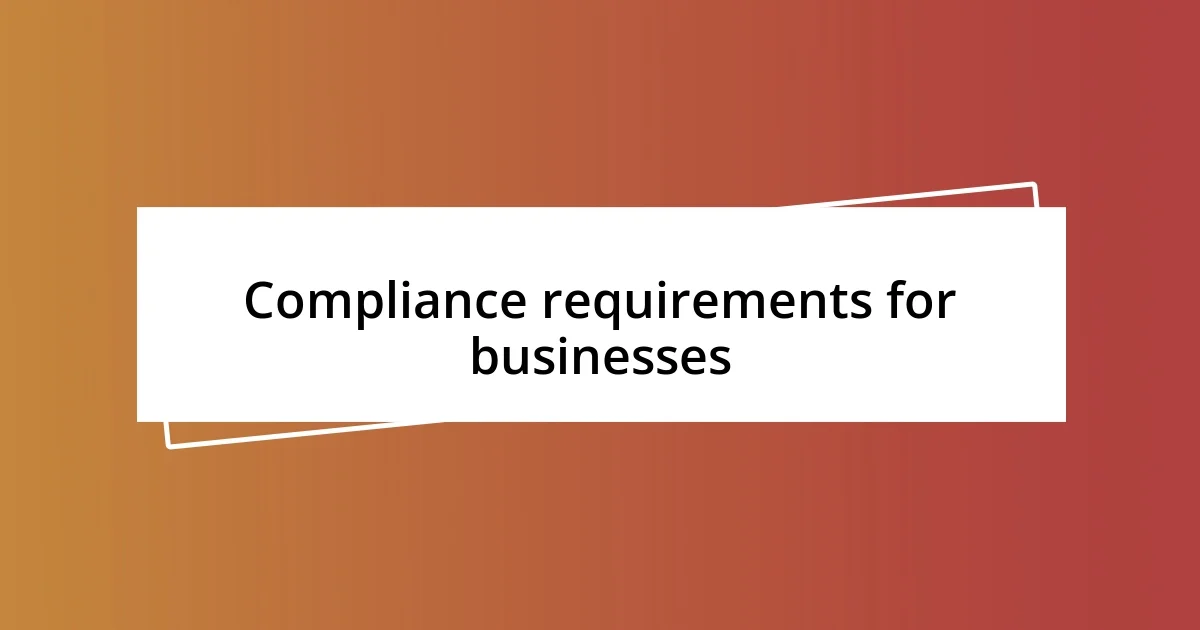
Compliance requirements for businesses
Compliance requirements can often feel like an ever-shifting maze, and trust me, I’ve felt that pressure firsthand. During my early days in international trade, I remember meticulously preparing my annual compliance report. I had this nagging worry that one missing signature or erroneous detail could lead to serious repercussions. The intensity of that moment grounded me in the understanding that compliance isn’t just about following rules; it’s about safeguarding your business’s future.
I learned the importance of staying abreast of regulations through my own trial and error, such as when I once overlooked the specifics of product labeling requirements for a new market. The ensuing stress when customs rejected my shipment was a stark reminder of how intricate compliance can be. It made me realize that investing time in understanding these requirements not only protects your bottom line but also builds trust with partners and customers.
As I progressed, I embraced the compliance landscape rather than shying away from it. Engaging with compliance training workshops turned into a form of empowerment for me. Have you ever had one of those “ah-ha” moments during training? I did, and it truly reinforced that understanding these complexities is an asset. By fostering a culture of compliance within your organization, you not only navigate challenges more proficiently but also cultivate a more resilient business model for the future.
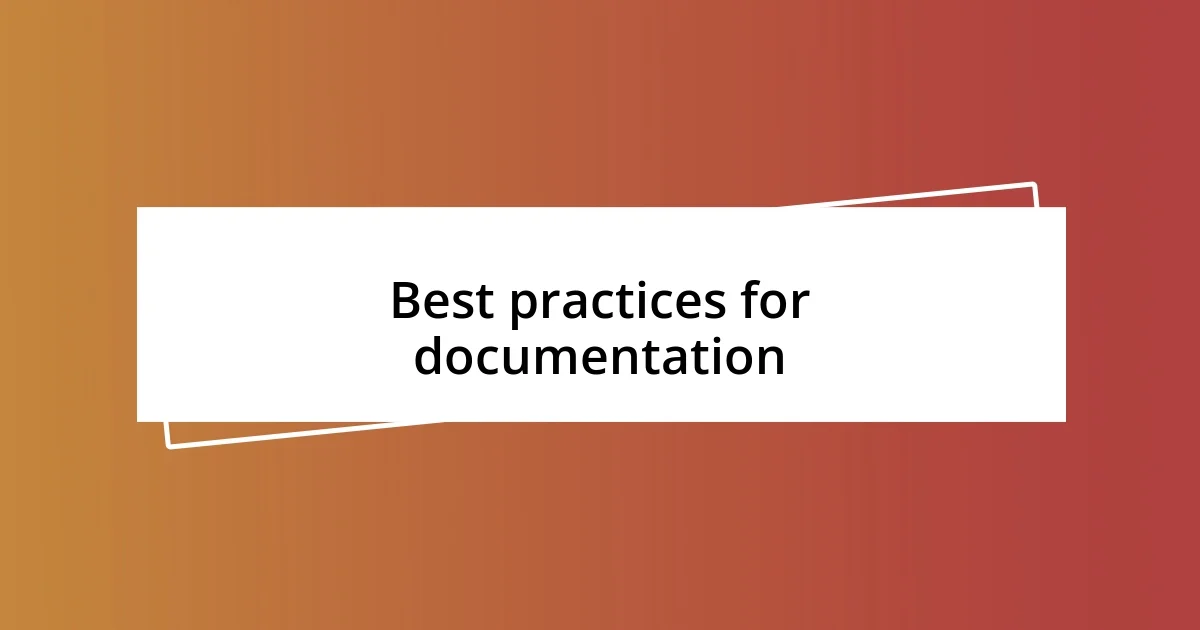
Best practices for documentation
Documentation is one area where I can’t stress enough the value of accuracy and clarity. In my early days, I mistakenly submitted an invoice with the wrong quantities listed. The shipment held at customs not only delayed delivery but also caused a ripple effect with my client’s operations. It was a lesson learned the hard way: double-checking every detail is non-negotiable. Have you ever been in a situation where a minor oversight turned into a major problem?
One best practice I developed is creating a centralized digital repository for all documents related to international trade. This includes invoices, packing lists, and compliance certificates. I remember the peace of mind I felt while preparing for a major shipment knowing that everything was just a few clicks away. Easy access allowed me to focus on strategy rather than frantically searching for paperwork at the last minute. It made me realize that organization is not just about efficiency; it directly impacts your ability to respond to unexpected challenges.
Additionally, I learned the importance of maintaining thorough records over time. Keeping a detailed log of communication with customs officials or trade partners became my go-to survival strategy. I once faced a situation where an inspector raised concerns about compliance. The notes I had kept showcased my transparency and proactive approach, which significantly helped in resolving the issue. It’s amazing how a little diligence in documentation can serve as your best ally in stressful situations, don’t you think?
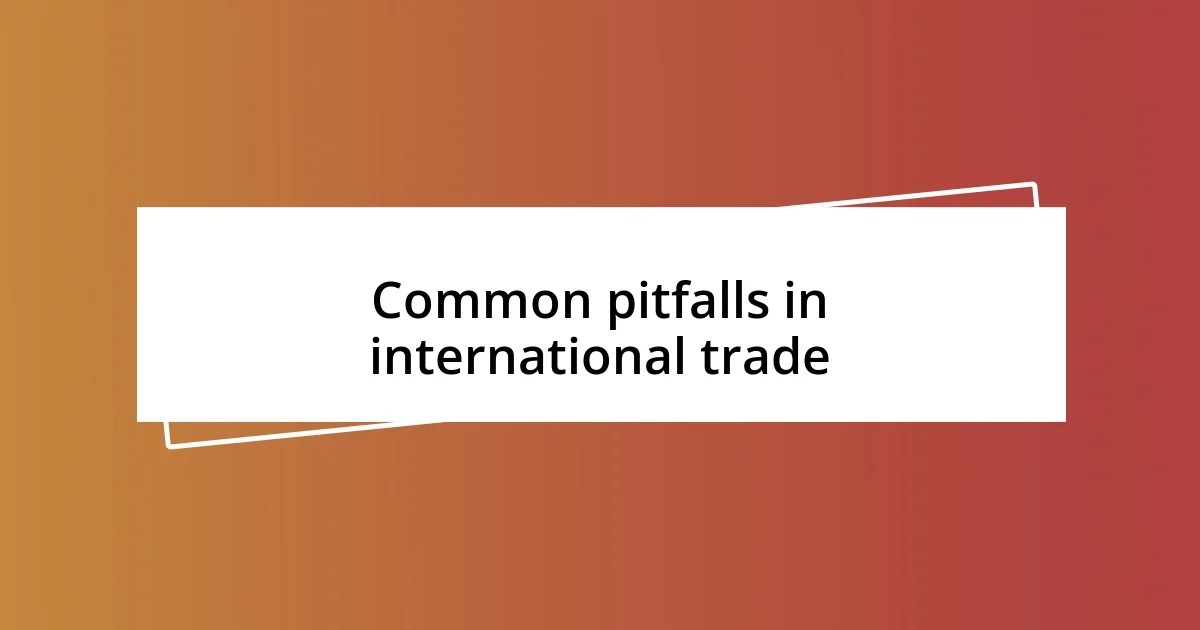
Common pitfalls in international trade
Navigating international trade can be a minefield, and one common pitfall I witnessed firsthand is the lack of due diligence on potential partners. I’ve experienced that intoxicating rush of excitement when entering a new market, which often overshadowed the critical importance of vetting suppliers and distributors. Once, I partnered with a company that looked good on paper, only to discover they had a history of delayed shipments and quality issues that impacted my reputation. Have you ever had a leap of faith turn into a hard landing?
Another significant mistake is underestimating the cultural nuances that play a role in international dealings. During a negotiation with a overseas client, I failed to recognize the importance of relationship building in their culture. My focus was solely on the figures and terms. It took some time to mend that gap, and I learned that understanding local customs can be just as crucial as the contracts themselves. Have you ever felt like you missed the mark because you didn’t grasp the broader picture?
Lastly, many businesses overlook the ever-changing landscape of trade agreements and tariffs. I remember feeling blindsided when new tariffs were announced after I had committed to a significant shipment. The financial impact was staggering, forcing me to reconsider my pricing and strategy. Keeping an eye on global trade dynamics and anticipating changes has since become part of my regular routine. Isn’t it fascinating how staying informed can make a world of difference in strategy and profitability?
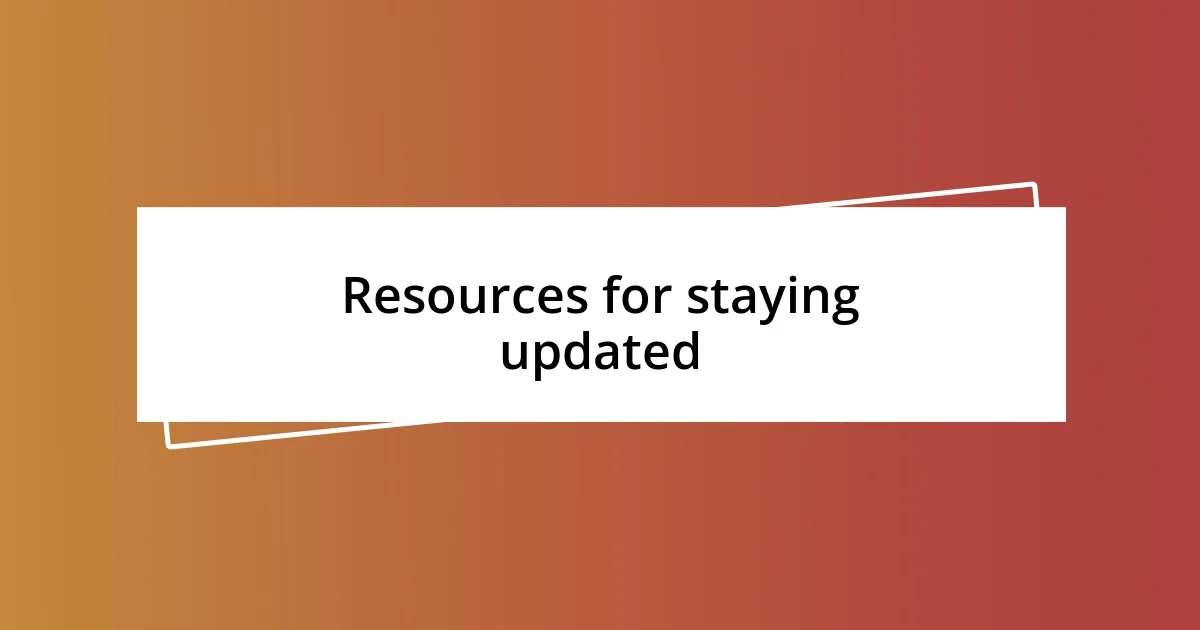
Resources for staying updated
Staying updated on international trade regulations is crucial for success, and I’ve found various resources that serve as my go-to guides. For instance, industry newsletters are a fantastic way to learn about the latest changes and best practices. I remember subscribing to a publication that regularly featured case studies and expert insights — it felt like having a mentor in my inbox each week. How can you put a price on that kind of knowledge?
Moreover, attending webinars and industry conferences has always enriched my understanding. I recall a particularly impactful seminar led by a trade expert who shared real-world scenarios and practical tips. Engaging with peers in discussions during these events fostered a sense of community, too. Ever noticed how discussing challenges with others in the field can spark new ideas? It’s an invaluable way to stay connected and informed.
Lastly, I encourage utilizing government websites and trade associations as reliable sources. These platforms often publish white papers, analyses, and updates on regulatory shifts. When I faced a sudden compliance requirement, I turned to a trade association’s resources and felt confident navigating the new standard. Isn’t it reassuring to know that there are structured resources available to guide our journeys?














